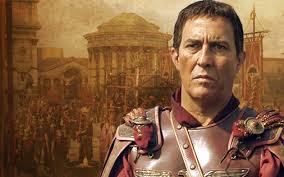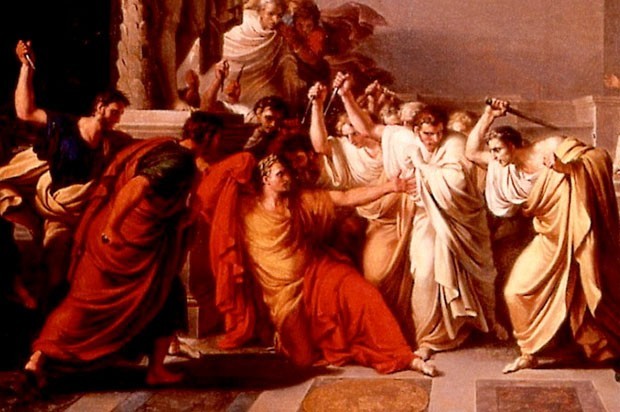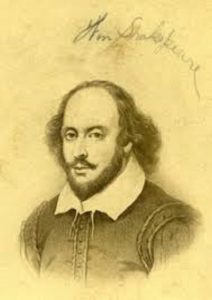William Shakespeare ‘Julius Caesar’, free English classic readers
William Shakespeare
H D.education σας προσφέρει ΔΩΡΕΑΝ Readers online σε απλά Αγγλικά !
το φανταστικό έργο του William Shakespear
“Julius Caesar”
Introduction Julius Caesar


Just as Brutus finished reading this letter, his servant came to tell him that Cassius and some other men had come to see him. Their faces were hidden. Brutus knew that they had come to plan Caesar’s death. Cassius and his friends were not sure that Brutus wanted to join them in their plan to kill Caesar. Then Cassius took Brutus to one side and spoke softly to him. Brutus turned to the others and shook hands with each one of them to show that he would join in their plan. “Let us make a solemn promise to kill Caesar,” said Cassius. “We have already promised to do it,” Brutus replied. “We are good Romans. No true Roman needs to make a solemn promise to keep him to his duty.” “We ought to kill Caesar’s friend, Mark Antony, too,” said Cassius. “He may become dangerous if we kill Caesar. It is safer if he and Caesar die together.” “No,” said Brutus. “We must not do more killing than we need. If we kill Antony, that would be like cutting off a man’s head and then cutting off his arms. Antony is only like an arm of Caesar’s.” “But I’m afraid of him,” said Cassius. “I wish that we could kill Caesar’s spirit and not his body,” said Brutus. ‘We aren’t going to kill Caesar because we don’t like him. Let everyone see that we are killing Caesar only because it is necessary for the good of Rome.” Brutus and his friends then arranged to meet Caesar the following day and kill him on his way to the Senate. Calpurnia Caesar’s wife was troubled and afraid that night. Caesar said, “There is no peace in heaven or earth tonight. Three times my wife, Calpurnia, cried out in her sleep: ‘Help! Help! They are killing Caesar.’ Calpurnia came to him. “Don’t leave your home today,” she said. “You have enemies. Many things tell of danger to you.” “I shall go,” said Caesar. “When my enemies see my face, they will be afraid. Men who fear death die many times; but brave men die only once. It seems strange to me that men should be afraid to die. Death is a necessary end and it will come when it will come. A servant entered. “The wise men,” he said, “say that you should not leave the house today. They have killed an animal and cut open its body. They looked for anything which seemed strange and found that the animal had no heart. Therefore they say that you must not go.” “I should be like an animal without a heart if I stayed at home,” said Caesar. “Oh, my lord,” cried Calpurnia. “You are brave too brave – but you are not wise. Don’t go out today. Say that it is my fear, not yours, which keeps you in the house. We’ll send Mark Antony and he can say that you are not well today.” “Well,” said Caesar, “to please you I will stay at home. Mark Antony shall say that I am not well.” Decius speaks Caesar had just decided this when Decius, Cassius’s friend, arrived. Decius had come to take Caesar to meet all the other people who ruled Rome, the Senate. He had promised Cassius and Brutus to make certain that Caesar left his house. “Tell the people of Rome that I will not come out today,” Caesar said. “My wife has asked me to stay at home: she had bad dreams about me, and is afraid for my life!” “The people are going to give you a crown today,” said Decius. “If you don’t come, they may change their minds. And everyone will laugh at you. They’ll say that you can’t come until your wife has better dreams. If Caesar doesn’t come, they’ll say ‘Caesar is afraid.’ Caesar said, “How foolish your fears seem now, Calpurnia! I should not have listened to them … I will go. Then Caesar left the house to go to his death. “Strike!” Caesar entered the Senate house. “Look, Brutus,” said Casca. “Our friend Trebonius is leading Mark Antony away. Where’s Metellus? He must go and speak to Caesar about his brother whom Caesar sent away from Rome.” “Metellus is there,” said Brutus. “Come, let’s press round them. Casca, you must strike first.” Metellus fell on his knees before Caesar. “Most high most powerful Caesar, I pray you… “Get up!” said Caesar. “If you kneel before me like that I shall treat you as a dog.” “I pray you, Caesar, allow my brother to return Rome … Will no one speak for me?” “I kiss your hand, Caesar,” said Brutus, “and pray that he may be allowed to return.” “Prayers may move other men,” answered Caesar “They change, but I do not change. I am fixed, like a star. There is no other star like me in the sky. I ordered him to go. My order will not be changed.” They pressed round him, crying, “Oh, Caesar! Great Caesar!” Then Casca cried out, “Strike!” and they struck Caesar with their swords. Brutus struck last. “You too, Brutus?” cried Caesar as he fell. Then Brutus cried out, “People and Senators, don’t be afraid. We don’t mean to hurt anyone. Come, let’s put our hands in Caesar’s blood and, holding our red swords above our heads, cry ‘Peace and Freedom!’ We shall be called the men who set Rome free.” —]


Antony had been with Caesar when he entered the building. As soon as Caesar was killed, Antony had gone home Now his servant went to see Brutus. He asked if Antony might come safely to Brutus and learn the reason for Caesar’s death. Brutus said, “Your master is a wise and brave Roman. Ask him to come to this place. We shall tell him, and he will return safe.” When Antony arrived he stopped by Caesar’s body and sadly said, “Oh, powerful Caesar, have all the great thing that you have done ended in this?” Then he turned to Brutus and his friends. “I don’t know, gentlemen, what your plans are. Who else must be killed? If it is me, kill me now – at the same time as the great Caesar and with the swords which are still red with his blood.” “Oh, Antony,” cried Brutus. “Our swords are not meant for you. Our hands are bloody, but our hearts are sad: we have killed Caesar only for the good of Rome. W love you like a brother. Wait till we have spoken to the people. Then you shall know why I, who loved Caesar when I struck him, have done this.” “My friends,” said Antony, “I do not doubt that you are wise. I am with you all and love you all. I hope that you will give me reasons, why Caesar was dangerous. Only I ask this. Let me take his body to the public square, where, as his friend, I may speak good of him.” Casca did not like this, but Brutus said, “I shall speak first and tell the reason for Caesar’s death, and say that we have allowed Antony to speak in Caesar’s honour.” “I don’t know what will happen. I don’t like it,” said Casca. But Brutus and his friends left Antony alone wit the body of Caesar. — Octavius — Antony looked sadly at the dead body of his friend; then he began to talk to Caesar as if he were alive. “Oh, forgive me, Caesar, for being so gentle to the men who killed you. You were the greatest man who ever lived. I shall deal with those who killed you. There will be a long war, many will be killed and many things will be destroyed. I make this solemn promise to you: I shall not rest until Brutus and Cassius are dead.” Just then a servant arrived from Octavius Caesar. Octavius was the son of Julius Caesar’s brother. Julius Caesar had sent for Octavius to come to Rome, and Octavius was now only a few miles outside the city. He did not know about his uncle’s death that morning. Antony said to the servant, “Go back and tell him what has happened. Rome isn’t safe for him. No! Wait till I have spoken to the people, then you may tell Octavius how things are.” — Brutus speaks to the people — The next day in the public square, Brutus told the people of Rome the reasons for Caesar’s death. A large crowd had gathered to listen to him. He said: “I loved Caesar as much as any of his friends. I killed Caesar because I loved Rome more. He wanted power. Did you want Caesar to live and make you all servants to him? Or do you want Caesar dead and to be free men? I shall kill myself with the same sword when it is for the good of Rome.” When Brutus had almost finished speaking to the crowd, Mark Antony and his servants carried Caesar’s body into the public square. The people cried, “Long live Brutus! Let him be Caesar! Let him be ruler in Caesar’s place! Let us carry him to his home!” Brutus said, “Good people, let me leave alone. Stay here with Antony and listen to him. We have allowed him to speak in Caesar’s honour.” “Let him speak,” said one man, “but he mustn’t speak against Brutus.” “It’s a good thing that Caesar is dead,” said another. “Silence!” said the first man. “Let’s hear what Antony has to say.” “Let’s hear him,” shouted all the people. — “Friends, Romans, countrymen” — Mark Antony began to speak. “Friends, Romans, countrymen – men of my own country. The bad things that men do live after them, the good is often forgotten after their death. Caesar was my friend, true and just to me. When the poor cried, he wept. Brutus says that Caesar wanted more and more power But I offered Caesar the crown three times, and wouldn’t take it. You all loved Caesar once: you had good reason to love him. Why do you not weep for him now ?” The men in the crowd began to talk. ”They have done wrong to Caesar,” one man said. “There isn’t a nobler man in Rome than Antony. See how his eyes are red with weeping,” another cried. “Yesterday,” said Antony, “Caesar was the most powerful man in the world; now he lies there. Look at him I could move your hearts to anger against Brutus and Cassius, but that would be wrong, because, as you know they are men whom we should honour. I would rather do wrong to the dead and to myself than to them.” Antony went on: “I have here a paper, written by Caesar. It is his will. It tells what is to be done with his money and land after his death. I won’t read it. – If I read it to you, you would want to kiss Caesar’s wounds.” “Read it! Read it!” cried the people. “No. It isn’t right that you should know how mud Caesar loved you. It would make you angry.” “Read it! Read the will!” cried the people. “I shouldn’t read it. I am afraid that I may do wrong to the honourable men who killed Caesar.” “They aren’t honourable men!” cried the people. “Read the will!” “Stand in a ring round his body. Be ready to weep now. This is the place where Cassius’s sword went through. Here is the hole that Casca made. Here was Brutus’s sword; see how the blood followed it. Brutus was Caesar’s truest friend. Caesar loved him. When he saw Brutus strike, great Caesar fell. Oh, what a fall was there! Then I and you and all of us fell down, while these men of blood stood over us. Ah! Now you weep.” “Oh, noble Caesar!” cried the people. “Oh, most bloody sight! Kill them! Burn their houses!” “Why?” said Antony. “Why are you going to do these things? What has Caesar done to make you love him? You have forgotten the will here it is. He gives each Roman seventy-five pieces of money. He leaves you all his gardens and his fields to walk and play in.” “We shall take his body to the Burning Place, and with the fire set fire to those men’s houses,” the crowd cried out. Then they carried away Caesar’s body. “Now I have started something,” said Antony. “Let’s see what happens.” A servant came to him. “Octavius has come to Rome. Brutus and Cassius have gone out of the city.” — Caesar’s ghost — Brutus and Cassius saw too late how dangerous Antony was. They gathered an army and prepared to fight Antony and Octavius’s men. Then Brutus and Cassius heard that Octavius and Antony were travelling towards Philippi, a place quite near their own army. “Let us march to Philippi at once,” said Brutus. “No,” said Cassius, “I don’t think that will be wise. It is better for the enemy to look for us. Then their soldiers will be tired when we fight against them.” “The people between here and Philippi are our enemies,” answered Brutus. “Antony’s army will be able to gather more men as they come. Our own army is as strong as it will ever be. We must not miss this chance or it will be lost for ever.” Cassius was silent. He agreed to go with Brutus to Philippi to meet the enemy. Brutus remained awake after Cassius had left his tent. Suddenly, the ghost of Caesar was standing before him. “Why have you come?” cried Brutus. “To tell you that you will see me at Philippi.” — Philippi — Antony, Octavious, and their army were at Philippi. “Now Antony,” said Octavius, “it is as we hoped. You feared that the enemy would stay up in the hills, but they have come down.” “I understand them,” answered Antony. “They think that this will show us that they are not afraid.” Cassius was preparing for the battle, but he was not happy. He had seen great birds following his army, as if they were looking for dead men to feed on. “If we lose this battle,” said Cassius to Brutus, “you will be led a prisoner through the streets of Rome.” “No, Cassius,” said Brutus, “don’t think that! This day must end the work that we began when we killed Caesar. I don’t know whether we shall meet again. So let’s say goodbye. If we do meet again, we shall laugh at this. If we don’t, it’s good to say goodbye now.” — Soon the battle began. At one time it seemed that Antony’s army was winning and at another time it seemed that Brutus was winning. At last, Cassius’s men began to fall back. Antony’s soldiers set fire to the tents of Cassiu’s army. Cassius saw that his army was losing the battle. He did not want to be caught by Antony’s men, so he asked one of his soldiers to kill him. Brutus found Cassius dead at the foot of a hill. He looked at Cassius’s own sword which was through, the heart of his brave friend. He remembered Caesar’s ghost and knew that he would lose the battle. The fight continued, and one after another of Brutus friends were killed. Brutus, with a few friends, heard the enemy coming nearer and nearer. But, like Cassius, Brutus was very brave and would not run away. He ordered soldier to hold out his sword. Then Brutus threw himself upon it. “Caesar, now be happy,” he cried as he died. “I did not kill you half so willingly as I have killed myself.” Mark Antony looked down at the body of Brutus. “This was the noblest Roman of them all,” he said. “All those others wanted Caesar’s power. Brutus thought of nothing but the good of all the people. He was truly a great man.
The end
***** Our Blog: Free English lessons + Global news κλικ ΕΔΩ About us 
